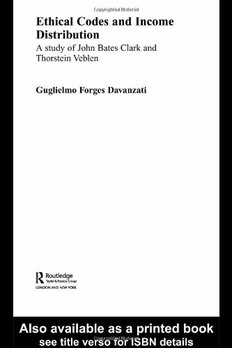
Ethical Codes and Income Distribution: A Study of John Bates Clark and Thorstein Veblen (Routledge Studies in the History of Economics) PDF
161 Pages·2006·0.747 MB·English
Most books are stored in the elastic cloud where traffic is expensive. For this reason, we have a limit on daily download.
Preview Ethical Codes and Income Distribution: A Study of John Bates Clark and Thorstein Veblen (Routledge Studies in the History of Economics)
Description:
In contemporary non-mainstream economic debate, it is widely thought that the functioning of a market economy needs a set of rules (i.e. institutions) which bind agents in their behaviour, allowing efficient outcomes. This idea is contrary to the General Equilibrium Model (GEM) where markets are pictured as working in an institutional vacuum and where social and historical variables play no role. However, in more recent times, a large group of economists have begun to insert social and moral variables into standard models based on the rational choice paradigm, following the increasing interest – on the part of firms – in the possible positive effects of adopting ethical codes. In this key new text Guglielmo Davanzati studies this burgeoning view that ethics and economics can be compatible. Does ‘morality’ affect income distribution? And, if so, what are the effects of the widespread adoption of ethical codes on the functioning of the labour market? Central to Davanzati’s efforts is the thesis that the roots of these new developments can be traced back to the pioneering work of Thorstein Veblen and John Bates Clark. Utilizing their contrasting works, Davanzati’s text illuminates the propagation of ethical codes within the two opposing frameworks i.e. the neoclassical and the institutional. Davanzati’s important book will be an invaluable reference for readers interested in history of economic thought, economics and moral philosophy.
See more
The list of books you might like
Most books are stored in the elastic cloud where traffic is expensive. For this reason, we have a limit on daily download.
